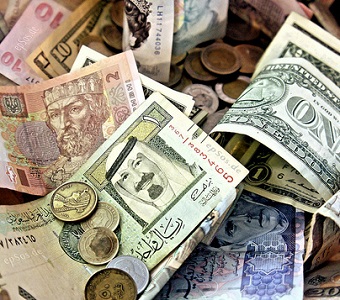THEOLOGY & APOLOGETICS
What's in your wallet?
Of Works and Faith
By Beth Hyduke


Single Page/Printer Friendly

Yesterday I went to our local big box hardware store to buy some plywood panels and 1x2x8's for a DIY carpentry project I was supposed to do last year. I located a cart with the obligatory bad wheel, loaded it down with lumber I handpicked from the available stock, and strong-armed it to a densely populated checkout line. Several price checks, manager overrides, and plastic card swipes later, I was finally up to bat. The cashier rang up my purchases and announced the grand total (grand as in larceny, not as in slam, canyon, or Ole Opry) with all the flourish of a teenager bored out of her mind. I opened my wallet, pulled out the wad of bills I had transferred that morning from a kitchen envelope to my billfold, and applied them to the palm of her hand. My part complete, I set to making some minor adjustments on the cart, repositioning the weight load in preparation of the final leg of the journey from register to truck. The cashier leaned over the counter, every gum-smacking ounce of her indignant at the nuisance I had proven to be. "Um, this isn't real money." Separated from the American twenties her right hand was now guarding close to her body were several oddly colored bills she held extended in her left; roughly the same size and shape as American twenties, but not American twenties. She swiveled her head back and forth, the international sign for never-gonna-happen. "I can't take this."
I knew right away what had happened. We went on a trip two years ago, and like I've always done when travelling abroad, we bought something small and insignificant, more for the change it would bring than for the thing itself. See, we collect foreign money as mementos of the places we've been and a few of those memento bills somehow wound up in our regular cash stash mixed in with the 'real money,' In a rush to get out the door, I hadn't even noticed, inadvertently mistaking them for American currency because of their similar dimensions and feel. The cashier was not making the same mistake.
Part of me wanted to stand up for the bills she was holding out as if they'd been liberally dusted in Anthrax. It's not as if they were counterfeit. I wanted to tell her that if she was to get on a plane and fly about 600 miles southeast, she would find herself in a beautiful island country that would be only too happy to take the bills she was snubbing. Of course on the other hand, from a practical standpoint, I knew she was right. She couldn't take it because domestic businesses (and their gum-smacking sales associates) do not recognize foreign currency as legal tender. Cut and dry. No wiggle room. Had I tried to pay my bill in French francs, British pounds, or Japanese yen, I would have been met with that same icy stare, that obstinate headshake until I could pay what I owed with an acceptable form of payment.
The Bible teaches that sin is a universal problem (Romans 3:23, 5:12, 8:7-8, James 2:10), with severe and eternal consequences (Romans 6:23, James 1:14-15). It equates sin to personal indebtedness (Matthew 6:12, Colossians 2:13-14). It tells us that all of us are in debt up to our eyeballs in sin. When our turn comes around in the cosmic checkout line and we stand before God, our grand total will be calculated and announced. The Bible warns that we owe more than we can ever repay. But it also points us to the only source of debt relief. If the problem of sin is great, it says, the solution God puts forth is far greater (Romans 5:20-21, 1 Peter 2:24). Colossians 2:14 tells us that Jesus "canceled the charge of our legal indebtedness, which stood against us and condemned us; He has taken it away, nailing it to the cross." In his eponymous first letter, Peter writes: "For you know that it was not with perishable things such as silver or gold that you were redeemed from the empty way of life handed down to you from your ancestors, but with the precious blood of Christ, a lamb without blemish or defect" (1 Peter 1:18-19).

Continue to Page Two
comments powered by Disqus
Published 3-9-2015

